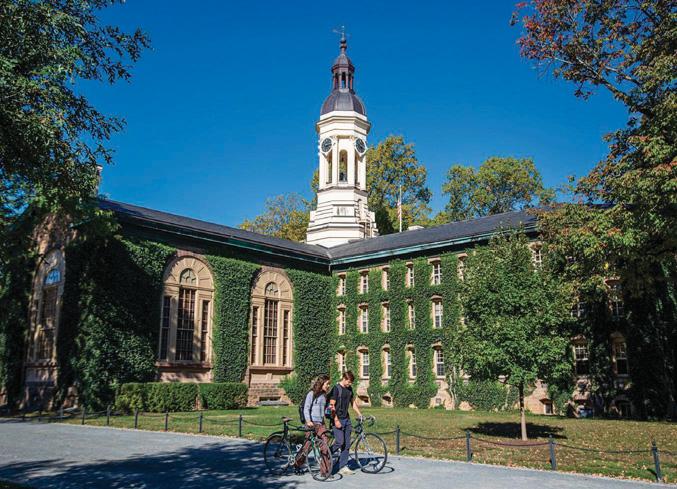The colleges and companies shaping America's leaders
Time
|January 27, 2025
BUSINESS IS EVOLVING FASTER THAN EVER BEFORE, and companies are rethinking the path to the C-suite. Whereas in the past aspiring leaders might earn their stripes by rotating through another part of the business for a year or two, today more top firms are “constantly providing people with new opportunities,” says Stephan Meier, a professor of business strategy at Columbia Business School. To supercharge the pace of skill-building, workers now have to change jobs more frequently. The ability to not only rapidly learn new terrain but also guide teams in overcoming new challenges is becoming an indispensable leadership skill, Meier says.

This is, in essence, what global consultancies like Accenture and Deloitte are designed to do. No surprise, then, that five of the top 10 best companies for future leaders in TIME and Statista’s new ranking are consultancies. The study analyzed the résumés of 4,000 top U.S. leaders in business, government, academia, nonprofits, and other sectors to see where they previously worked and studied. Compared with last year’s list, that’s twice as many résumés drawn from a wider range of fields and leadership positions. With 175 organizations now included, the new ranking offers a wide-angle look at the places today’s top leaders are most likely to have spent at least some of their professional lives.
The list of colleges most commonly attended by American leaders remains heavily tilted toward the Ivy League or similarly prestigious schools (such as Stanford, MIT,
Nassau Hall at Princeton, which ranks ninth among U.S. colleges producing top leaders
University of California, Berkeley, and University of Chicago), underscoring what University of Arkansas associate professor Jonathan Wai calls “a huge education divide in this country.”
Cette histoire est tirée de l'édition January 27, 2025 de Time.
Abonnez-vous à Magzter GOLD pour accéder à des milliers d'histoires premium sélectionnées et à plus de 9 000 magazines et journaux.
Déjà abonné ? Se connecter
PLUS D'HISTOIRES DE Time

Time
TRUMP
LAST YEAR'S PERSON OF THE YEAR SPENT 2025 TESTING THE LIMITS OF HIS OFFICE
5 mins
December 29, 2025

Time
BEST OF CULTURE 2023
The art that entertained, moved, and inspired us this year
3 mins
December 29, 2025

Time
NEAL MOHAN
THE YOUTUBE CEO HAS LED THE PLATFORM INTO A NEW ERA OF TV AND VIDEO DOMINATION
16 mins
December 29, 2025

Time
LEONARDO DICAPRIO
MOVIE BY MOVIE, THE ACTOR HAS CRAFTED A HOLLYWOOD CAREER THAT'S BUILT TO LAST— EVEN IN AN INDUSTRY DEFINED BY CHANGE
14 mins
December 29, 2025

Time
A'JA WILSON
HER FOURTH MVP AWARD. HER THIRD WNBA TITLE. IT WAS A VERY GOOD YEAR.
21 mins
December 29, 2025
Time
HOW THE U.S. CAN LEAD
Artificial intelligence is reshaping the world.
2 mins
December 29, 2025

Time
State of the art
AS TIME’S CREATIVE DIRECTOR, I’VE been privileged to work with some of the world’s best artists and photographers in creating thousands of images for our cover.
1 mins
December 29, 2025

Time
The fractured agenda
BY THE TIME NEGOTIATORS FROM AROUND THE WORLD gathered in the Amazonian city of Belém in November to discuss the future of climate action, the world had already experienced an alarming year: near-record global temperatures, unprecedented heat waves across continents, and extreme flooding that scientists say would have been virtually impossible without human-driven warming.
2 mins
December 29, 2025

Time
PERSON OF THE YEAR
SINCE 1801, AMERICAN LEADERS HAVE GATHERED in Washington, D.C., to attend the Inauguration of a new President.
4 mins
December 29, 2025
Time
AI'S NEXT FRONTIER IS HERE
In 1950, when computing was little more than automated arithmetic and simple logic, Alan Turing asked a question that reverberates today: Can machines think? It took remarkable imagination to see what he saw—intelligence might someday be built rather than born.
1 mins
December 29, 2025
Listen
Translate
Change font size

